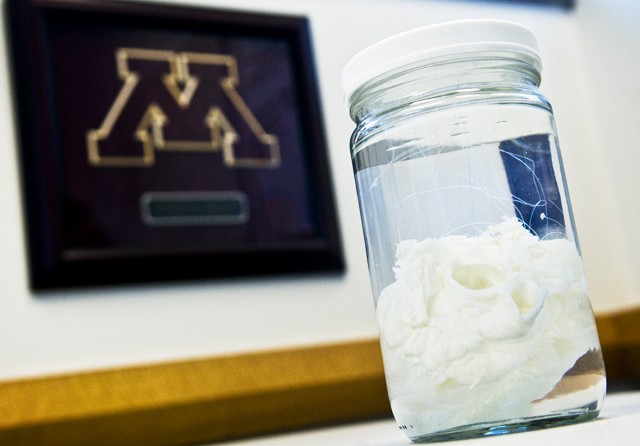After a licensing agreement announced Tuesday, a University of Minnesota professorâÄôs breakthrough discovery in heart research is about to take the next step: commercialization. The University signed an exclusive licensing agreement with Miromatrix Medical Inc. regarding research done by Doris Taylor, a professor in the Department of Integrative Biology and Physiology. The deal includes equity, future royalties and sublicensing fees for the University, but further details have not yet been disclosed. Both sides said the deal could have unlimited potential in both medical advancements and revenue. TaylorâÄôs research at the University made headlines two years ago when she was able to create a beating rat heart through a process that had not yet been seen. Taylor said they were able to remove cells from a fresh rat heart through a detergent in the blood supply. After this process, the heart is left with only the protein fibers that compose its backbone. âÄúWhat was novel about the idea is being able to use the blood supply of a tissue or organ to remove the cells,âÄù she said. With this technique, Taylor said the blood vessel tree was still intact, which meant new cells could be fed back through the blood vessels and create a new organ or tissue. Taylor said her research could result in the ability to build new hearts for the nearly 22 million people currently living with heart failure and the thousands of people who could die while waiting for a new heart. Taylor said what she has learned in building a rat heart could apply to other organs and tissues as well. âÄúKidney, liver, lung âÄî all of a sudden itâÄôs a whole new world in terms of what is possible,âÄù Taylor said. Although Taylor is proud of her past accomplishments with the creation of a rat heart, she said the ultimate goal is to change the lives of people with disease, and in order to do so, it needs to become a commercial product. âÄúThis is obviously something that we want to move beyond the laboratory,âÄù Taylor said. TaylorâÄôs research has now officially begun the transition out of the University and into Miromatrix âÄî a transition that that was swift because of the extensive possibilities. âÄúWe took a methodical approach to this startup and licensing agreement due to the tremendous potential of Dr. TaylorâÄôs research,âÄù Vice President of Research Tim Mulcahy said. Robert Cohen took over as CEO of Miromatrix in mid-November and has since worked constantly with the University to license TaylorâÄôs technology. The agreement was completed Feb. 4. Cohen, who spent the majority of his career working with universities, said the process with the University of Minnesota could not have gone any better. âÄúIt has been the most efficient process I have ever been through,âÄù he said. In MiromatrixâÄôs own laboratories, Cohen said they will focus on cardiovascular products, but TaylorâÄôs technology can expand to all areas of medicine. âÄúThis is a platform technology,âÄù Taylor said. âÄúIt is not just about one area.âÄù In order for TaylorâÄôs technology to expand across the world of medicine, Cohen said they will seek collaborations with other companies and institutions. âÄúThe potential for the technology is so broad and deep that our goal is to get as many sound products out there as possible,âÄù Cohen said. The technology could make processes like kidney dialysis obsolete because patients would be able to obtain a new kidney, according to Cohen. âÄúIn 25 years from now, you should be able to make organs for anyone that needs them,âÄù Cohen said. âÄúMany people think of that as, in effect âĦ eliminating the donor waitlist.âÄù Taylor said transitioning an idea out of a university setting and into a business setting always creates new hurdles. To make the transition as easy as possible, Taylor said it is important to surround yourself with the best people âÄî something that Taylor says she is confident is being done. âÄúI am excited because what I have watched is really important conversation between the University, the company and the state [of Minnesota] about how to make this a win-win for everyone,âÄù Taylor said. Cohen said they are early on in the process of gaining funds, but he is confident TaylorâÄôs technology will have a lot of appeal. âÄúIt is the kind of thing that the local community is very much in support of because Dr. TaylorâÄôs work has been known for years,âÄù Cohen said. Taylor is confident in what Miromatrix can accomplish. âÄúI want this company to succeed because I want to change peopleâÄôs lives, and we do what we do because we want to make a difference in the world.âÄù

Image by Matt Mead
Taylor’s research at the University made headlines two years ago when she was able to create a beating rat heart through a process that has not yet been seen.
U licenses heart growth technique
Dr. Doris Taylor’s research has unlimited potential after a deal with Miromatrix.
Published February 17, 2010
0

